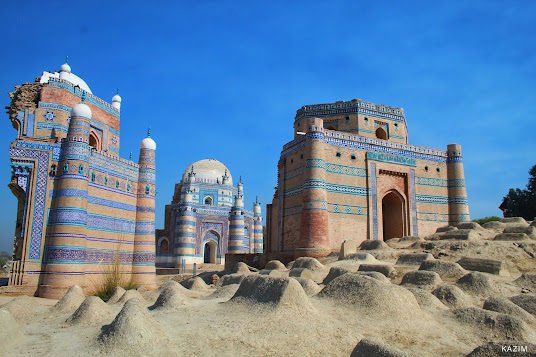Pakistan's Crypto Boom May Just Determine the Direction of the World
Social Media may be banned, terrorism may be on the rise, and crypto trading may end indefinitely!
Let's Unpack A Few Things
Earlier in 2021, Pakistan experienced a crypto boom as everyone ranging from the most inexperienced to big-time investors began trading and mining Bitcoin, the most prominent cryptocurrency. Much of the buzz has been promulgated via social media platforms such as Youtube, Tik Tok, and Facebook.
Why the buzz? Well, trading Bitcoins can get you lots of money. A lot of it can be attributed to how volatile valuations oscillate, but most of it has to do with the underlying design of a cryptocurrency.
Okay, So What Exactly Is A Cryptocurrency?
A cryptocurrency is a digital currency securitized via cryptography, abrogating nearly all forms of counterfeit.
These trading platforms utilize decentralized networks based on blockchain technology, meaning that currency is not omitted or regulated by the government.
This means that trading occurs almost anonymously between two entities online without any "middle-man" so to speak. Banks can't make money off of commissions and interest fees while people can securely exchange money with others virtually anywhere!
Consequently, valuations fluctuate rampantly and can essentially dissolve into thin air given the trading frequencies and usage of tokens such as Bitcoins.
While banks have to worry about locking their doors to securitize money, cryptocurrencies have to worry about documenting each transaction within ledgers. As another transaction is made, the ledger expands as another block is added to the pre-existing chain of transactions, thus a blockchain.
People can also make money by working as Bitcoin miners who are tasked to ensure the authenticity of each transaction through the completion of super hard math problems.
The Downside: Money Laundering
As of now, cryptocurrencies sound just too perfect. Indeed, they are. The biggest problem with digital currencies being somewhat anonymously traded through decentralized platforms is that terrorist organizations can basically authenticate wrongfully stolen money as legally acceptable.
The process of laundering money happens 3-fold:
First comes placement: criminals place the stolen money in some type of deposit. In this case, it would be a Bitcoin account.
Second is layering: the money is transferred numerous times in multiple different ways via different accounts to make everything appear normal. This is easily done through Bitcoin as you can easily make all of these transfers through 1 or 2 phones with numerous different accounts.
Third, integration: pull the money out of the receiving account and use it as you please.
According to the United Nations Office on Drugs and Crime, "global money laundering transactions account for roughly $800 billion to $2 trillion annually, or some 2% to 5% of global GDP" (What is Money Laundering).
This process works so well because the sender may be using a fraudulent account while the receiver is more-so presumed as a legitimate one.
So What Does Pakistan Have To Do With Any Of This??
The Tehreek-e- Taliban (TTP) terrorist organization has caused massive sociopolitical conflicts and governmental insurrection. Although the organization is rooted in many distinct ideo-political beliefs, much of the recent conflict derives from protests against France's "anti-Islam cartoons in a French Magazine of Mohammad" (Pakistan Blocks Social Media Platforms).
2 officers died and 580 officers were wounded while 3 demonstrators died.
The protests and government crackdown posits Pakistan in a critical position as the third COVID-19 wave has been exacerbated by damaged medical facilitates and opposition to social distancing practices. Moreover, the Financial Action Task Force (FATF) may be more stringent in terms of regulating Pakistan-based affairs.
The FATF cited Pakistan in the grey list in terms of terrorist activity as other terrorist organizations such as Lashkar-e- jabbar (LeJ) and the Muttahida Jehad Council (MJC) are located in Pakistan.
Consequently, international governments may step in and set regulations or even sanctions on Pakistan.
Generally, sanctions are never a good sign and have been historically perceived as declarations of war (legit U.S. v Japan during World War II).
Countries may take sides, terrorists organizations may strike back, and a lot global war may break loose.
A Less Bleak Scenario...But Still Worrisome
The more practical outcome out of all of this is governmental crackdown on social media and, more importantly, cryptocurrencies.
As previously stated, much of the buzz and information regarding crypto-trading is circulated through social media platforms.
What a convenient way for terrorist organizations to understand the inner workings of the potentially biggest laundry machine!
I know what you're thinking: "A country would never ban social media." Just because Trump threatened to ban Tik Tok in the name of capitalism doesn't make this scenario a bunch of fear mongering.
Pakistan's government actually shut down all social media platforms (and I mean ALL of them) in mid April to crackdown against the TTP due to the massive insurrection publicized by them via social media platforms.
Pakistan's government has ensured to take rigorous action to mitigate the TTP and its influence on political ideologies.
While the government has stated that it will look into cryptocurrencies as a potential trading source, it will also seek to regulate trading to ensure that terrorist organizations aren't laundering money virtually.
This has led to the Lahore University of Management Sciences, one of Pakistan's leading universities, to receive a grant worth $4.1 million to study Bitcoin. Pakistani traders, on the other hand, are receiving greater suspicion from the government as they are deemed potential criminals.
What's At Stake?
The well-being of citizens' financial privacy and safety around the world are at stake. The issue in Pakistan serve's as an example to question what steps ought to be taken by governments to both ensure the protection of traders and prevent terrorist organizations from laundering stolen money.
References:



Once again, a very fascinating (and informative) blog as you explore a topic with many tentacles (appropriate for cryptocurrencies). Really interesting to see the way terrorist organizations have jumped in to exploit laundering possibilities. Thank you for not just writing a para (or two) but identifying, addressing, explaining, analyzing, etc topics related to cryptos in Pakistan (and beyond).
ReplyDelete